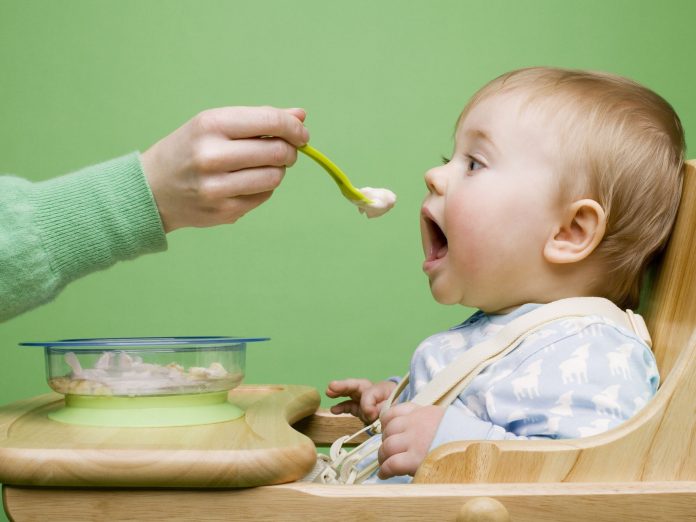Starting solids for your baby is an exciting milestone and one that should be celebrated! However, it’s also important to make sure that your baby is ready for solid food, from a developmental point of view. The WHO recommends exclusive breastfeeding for the first six months of life, so it’s best to wait till six months to start solids. Even water is not recommended before this age. Here are some important signs that show that your baby is ready for solid food:
- Baby can hold her head on her own.
- The baby is able to sit upright with or without support.
- The baby can move the tongue in and out but does not push the food out.
- Baby makes chewing motions, especially when she sees others eat.
- When you are eating, she puts out her tongue and closely watches your hand and mouth.
How to start solids for your baby?
Moving your baby from a complete milk-based diet to a variety of solids is a big change, so it’s best to do it gently and gradually. When weaning babies, there are usually multiple approaches.
On one hand, you can go the traditional way of feeding your baby super-smooth purees and porridges, adjusting the texture as baby grows older. Another way is to opt for baby led weaning, where you let baby decide what she wants to eat, usually picking from your plate – there is no pureeing involved here. Or you could do a mix of both, offering both pureed foods and whole baby-safe foods, letting your baby enjoy the best of both worlds.
Please remember that during the initial stages of weaning, breast milk is still the main source of baby’s food, so continue to breastfeed on demand. Solids are first offered as complementary food and slowly increased in quantity. At first single ingredient foods are offered, like just one grain or fruit or vegetable – these are called Stage 1 foods. As the baby gets familiar with these, you can move to Stage 2 foods, that include multiple ingredients.
Food allergies and Intolerance:
When introducing a new food to baby, make sure you follow the 3-day rule, where you offer the food first, and wait for three days to watch for an allergic reaction. This should give you enough time to know if your baby has a food allergy. Common culprits are eggs, nuts and wheat. Although most babies without any family history of allergies don’t show any signs, it’s better to be safe than sorry. Be particularly careful to stay away from foods that should be avoided before 1 year of age.
Things to remember before starting solids for your baby:
Whatever you’re feeding your baby, please remember that homemade food mixes are better than commercial baby food. Commercial or branded baby food products have lots of preservatives and added flavors, none of which are good for your growing baby. Going organic is even better, both for your baby and the environment.
At the beginning, babies eat very little, so don’t stress too much about how much a baby should eat. Follow our feeding schedule for starting solids and build it from there. Just make sure that you’re feeding quality food that’s safe for the baby. Here are some more tips to remember when starting solids for your baby.
- Always feed the baby sitting upright, preferably in a high chair. Never feed baby lying flat on the back.
- Always check the temperature of the food before feeding.
- Make sure you have all the essential feeding products for your baby, made of good quality, BPA-free material.
- Use a soft-tipped spoon so that it does not injure the tender gums of the baby.
- A thicker consistency ensures that the food doesn’t fall off the spoon.
- Let the baby finish his meal within 2 hours of preparation and discard any leftovers.
- Everything used to prepare and serve baby’s food needs to be sterilized correctly so that baby’s delicate immune system is protected.






























